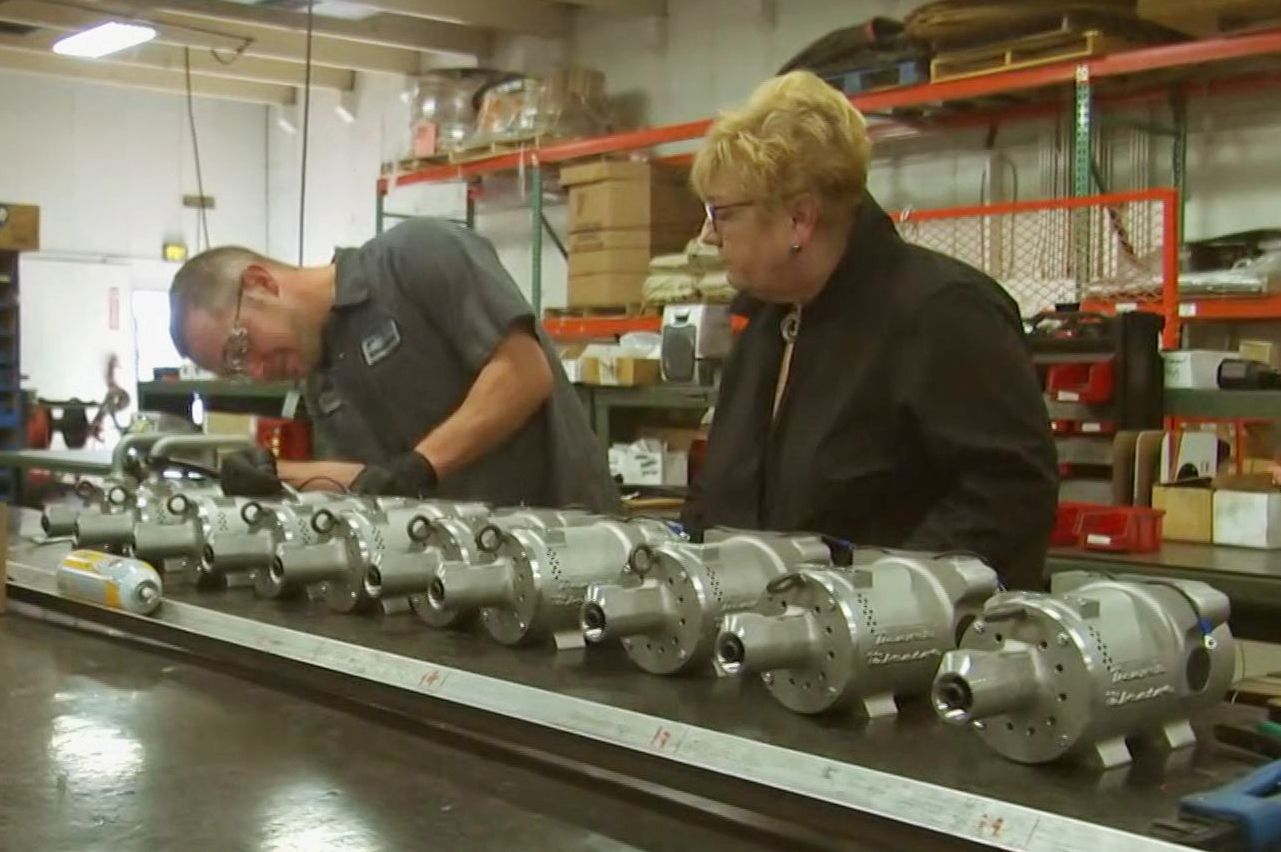BUSINESS NEWS
Main Street feels the pinch from China tariffs
[ad_1]
Sandra Payne, owner of Denver Concrete Vibrator.
CNBC
Sandra Payne said she held out for as long as possible before raising her prices.
The owner of Denver Concrete Vibrator, which manufactures equipment that strengthens and settles concrete for infrastructure projects, said tariffs finally took a toll on her business. Raising prices modestly became necessary to remain competitive as her vendors, many of whom rely on imports from China, began charging more.
“We waited a long time to increase prices. We finally did a small increase recently,” said Payne, who has owned the Colorado business for nearly two decades. “But that still won’t cover what we expect in the coming months or years.”
Payne said she’s tried to source locally and domestically, but many vendors disappeared after the recession, making relying on imports more of a constant. While cutting her staff of eight, including Payne and her husband, has not been necessary as of yet, the future is uncertain.
As a U.S. manufacturer, Payne has a clear message: Tariffs are doing more harm than good.
“For years I have been hearing that manufacturing is lost in America,” Payne said. “And yet there are thousands of manufacturing companies just like this one out there trying to make things domestically. I think it’s going to hurt us very badly.”
Small U.S. business advocates and owners such as Payne are increasingly pushing back on tariffs. The National Federation of Independent Business said about one-third of its membership has reported somewhat or significant negative impacts as a result of recent trade policy changes with Mexico, Canada or China.
Another recent poll from BizBuySell, an online business for sale marketplace, surveyed more than 1,700 small business owners and found 43% say China tariffs will increase business costs, and of that group 64% plan to increase prices to stay afloat. The poll also found that nearly two in three small business owners have considered switching to suppliers outside of the U.S. and of that group more than half are looking for a U.S.-based supplier. What’s more, one in five businesses said they did not believe they could survive if Chinese tariffs last more than one year.
That’s the position Bill Skalish’s Granite Tech Inc. in Landenberg, Pennsylvania, finds itself in. Skalish said his business is basically on hold due to tariffs on Chinese goods. The company imports quartz, granite and marble countertops from China to use in hotels, student housing and more. His tariff and duty rate combined is currently over 300%. He’s hit with regular 301 tariffs on his imports of 25%, but faces extra charges because quartz is a product that the U.S. has found China is dumping, or subsidizing.
Skalish testified before the International Trade Commission and spoke with the House Small Business Committee on the impact the trade war has had on business. He said he can no longer afford his trade attorney and operations have all but ceased as domestic quotes are much more expensive than Chinese imports and tariffs are not sustainable. He said two of his nine employees have left in recent months as the business has slowed and he’s been unable to offer perks such as bonuses.
“We are currently in hibernation, meaning we are not importing anything and haven’t since November,” Skalish said. “We cancelled purchase orders and had projects in China that we did not ship on the advice of our attorney and freight forwarder.”
The International Trade Administration says the extra duties — known as antidumping and countervailing duties — are there to protect American businesses being negatively affected by Chinese dumping. U.S. companies — including Cambria Company, a Eden Prairie, Minnesota-based manufacturer of natural stone surfaces — petitioned the Commerce Department for relief from “unfairly traded” quartz surfaces from China, which totaled some $460 million in imports in 2017.
“Commerce determined that the products were indeed dumped and subsidized. In addition, the U.S. International Trade Commission — an independent agency — conducted its own investigation and determined that these imports injure the domestic industry,” an International Trade Administration spokesperson said in a statement. “The purpose of AD and CVD duties is to protect domestic businesses and workers from the injurious effects of dumped and subsidized imports. This protection is available to companies large and small.”
One positive for Skalish — a ruling on June 11 determined the imports would not be subject to retroactive duties. He said it’s a relief but not enough.
“We are a small business, and having these tariffs is going to put us out of business, unfortunately,” Skalish said. “It’s having a dramatic, negative effect on our company and companies with similar business models in the construction industry. The end result is going to be a slowdown in the economy.”
Sandra Payne, owner of Denver Concrete Vibrator.
CNBC
Meanwhile, Payne is bracing for more price instability. In fact, she recently received notice from one of her vendors that said “due to extreme market volatility, prices and availability are subject to change daily.”
“This makes planning and budgeting nearly impossible for a small business like mine,” she said.
[ad_2]
Source link









